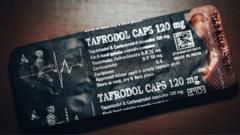In response to a revealing BBC investigation, Indian regulators have imposed a ban on the export of tapentadol and carisoprodol, two powerful opioids identified as contributing factors to a serious health crisis in West Africa. The Drugs Controller General of India, Dr. Rajeev Singh Raghuvanshi, confirmed the decision in a letter that referenced the unauthorized distribution activities of Aveo Pharmaceuticals, a Mumbai-based company linked to the illegal shipment of these drugs to countries such as Ghana, Nigeria, and Cote D'Ivoire.
Following the investigation, India's Food and Drug Administration (FDA) acted swiftly, raiding Aveo’s facility and seizing its entire stock of the contentious drugs. The drugs have been associated with severe health risks, including respiratory difficulties, seizures, and a potential fatal overdose, despite their increased popularity as street drugs across West African nations due to their affordability.
During the undercover investigation, a BBC operative posed as an African businessman and gained access to Aveo Pharmaceuticals' factory, where a director acknowledged the risks of their products, referring to them as "very harmful" while also noting their commercial potential. In Nigeria, where opioid abuse is estimated to affect four million citizens, the need for such measures has become critical as the country grapples with an alarming rise in drug-related issues.
Dr. Raghuvanshi's recent announcement has prompted further investigations by the FDA to preserve public health and ensure that such illicit trade does not compromise India's integrity in the pharmaceutical industry. They have vowed to take strict legal action against any parties involved in illegal drug activities threatening the nation's reputation.






















